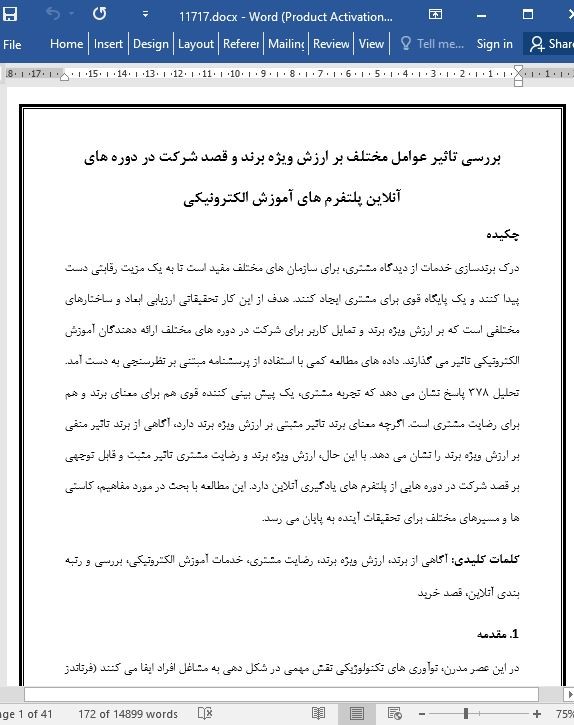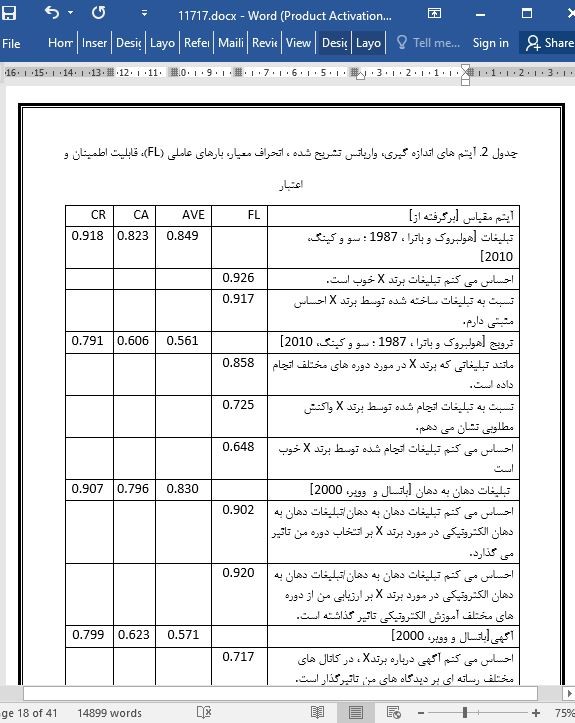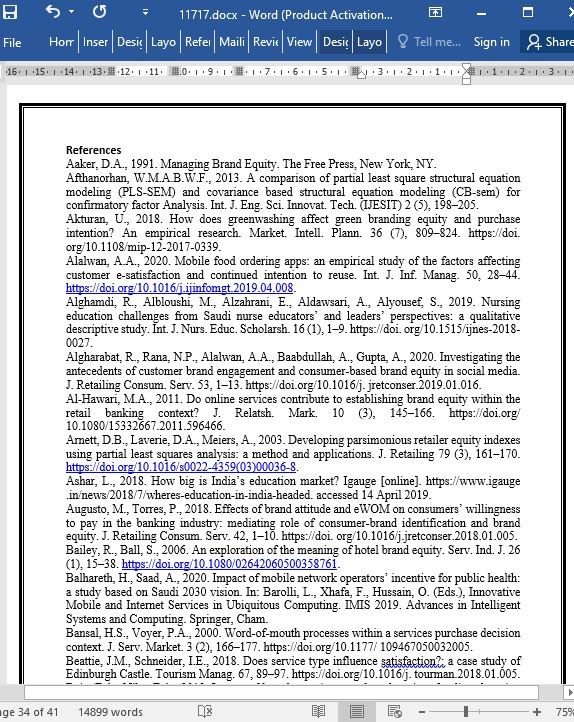
بررسی تاثیر عوامل مختلف بر ارزش ویژه برند و قصد شرکت در دوره های آنلاین
چکیده
درک برندسازی خدمات از دیدگاه مشتری، برای سازمان های مختلف مفید است تا به یک مزیت رقابتی دست پیدا کنند و یک پایگاه قوی برای مشتری ایجاد کنند. هدف از این کار تحقیقاتی ارزیابی ابعاد و ساختارهای مختلفی است که بر ارزش ویژه برند و تمایل کاربر برای شرکت در دوره های مختلف ارائه دهندگان آموزش الکترونیکی تاثیر می گذارند. داده های مطالعه کمی با استفاده از پرسشنامه مبتنی بر نظرسنجی به دست آمد. تحلیل ۳۷۸ پاسخ نشان می دهد که تجربه مشتری، یک پیش بینی کننده قوی هم برای معنای برند و هم برای رضایت مشتری است. اگرچه معنای برند تاثیر مثبتی بر ارزش ویژه برند دارد، آگاهی از برند تاثیر منفی بر ارزش ویژه برند را نشان می دهد. با این حال، ارزش ویژه برند و رضایت مشتری تاثیر مثبت و قابل توجهی بر قصد شرکت در دوره هایی از پلتفرم های یادگیری آنلاین دارد. این مطالعه با بحث در مورد مفاهیم، کاستی ها و مسیرهای مختلف برای تحقیقات آینده به پایان می رسد.
1. مقدمه
در این عصر مدرن، نوآوری های تکنولوژیکی نقش مهمی در شکل دهی به مشاغل افراد ایفا می کنند (فرناندز و همکاران، ۲۰۲۰؛ ویویان و همکاران، ۲۰۱۴). افزایش محبوبیت خدمات یادگیری آنلاین (یا خدمات یادگیری الکترونیکی) با افزایش تعداد دورههای آنلاین و حتی مدارک آنلاین همراه بوده است. دوره های آنلاین گسترده موجود (MOOC) به دانش آموزان یا متخصصان در رشد شغلی آن ها کمک کرده است (وون اشمیدن و همکاران، ۲۰۱۹). با این حال انتخاب بهترین دوره از بین بیش از ۹۴۰۰ دوره موجود (شاه، 2018)، به جای یک دوره متوسط (ری و همکاران، ۲۰۱۹)، کار گیج کننده ای است و دانشجویان یا متخصصان به طور کلی دوره هایی را از سازمان هایی انتخاب می کنند که تصویر برند بهتری دارند. برندسازی به ارائه دهندگان خدمات کمک می کند تا بر سر ویژگی هایی غیر از قیمت گذاری به رقابت بپردازند (بیلی و بال ، 2006). در این عصر بازاریابی پویا و رقابت مداوم، توسعه یک تصویر برند قوی، برای توسعه یک پیوند احساسی با کاربران ضروری است (بویل و همکاران، ۲۰۱۳؛ گونالز- مانسیلا و همکاران، ۲۰۱۹). با این حال، تحقیقات اندکی عواملی که ارزش ویژه برند را تحت تاثیر قرار می دهند و تمایل کاربر برای شرکت در دوره های پلتفرم های آموزش مجازی را ارزیابی نمودند.
7. نتیجه گیری
برای پیشی گرفتن از رقبا و ایجاد یک پایگاه مشتری قوی برای ارائه دهندگان خدمات، بررسی فعالیت های بازاریابی و استراتژیک مختلفی که می توانند ارزش ویژه برند را بهبود بخشیده و مشتریان را راضی نگه دارد، بسیار مهم است. این مطالعه تجربی برای بررسی پیش بینی کننده های مهم یا ارزش ویژه برند و تمایل کاربر به استفاده از پلتفرم های یادگیری الکترونیکی، از یک نظرسنجی مبتنی بر پرسشنامه استفاده کرده است. تجزیه و تحلیل کمی ۳۷۸ پاسخ با استفاده از تجزیه و تحلیل عامل تاییدی نشان می دهد که تجربه مشتری یک پیش بینی کننده مهم هم برای معنای برند و هم برای رضایت مشتری است. نتایج تجزیه و تحلیل نشان می دهد که تجربه کاربر با ارائه دهنده، یک پیش بینی کننده مهم هم برای معنای برند و هم برای رضایت مشتری است. همچنین به این نتیجه رسیدیم که معنای برند، مهم ترین پیش بینی کننده ارزش ویژه برند است که به نوبه خود بر قصد مشتری برای شرکت در دوره های آنلاین تاثیر می گذارد.
Abstract
Understanding service branding from the customer perspective is helpful for various organizations to attain a competitive edge and build a strong customer base. This research work aims to evaluate the various dimensions and constructs that affect brand equity and user's willingness to undertake courses from various e-Learning providers. Data for the quantitative study was obtained using a questionnaire based survey. Analysis of the 378 responses reveals that consumer experience is a strong predictor of both brand meaning and customer satisfaction. Although brand meaning positively impacts brand equity, brand awareness demonstrates a negative effect on brand equity. However, brand equity and customer satisfaction have a significant and positive impact on intention to undertake courses from online learning platforms. The study concludes with discussion on different implications, shortcomings, and directions for future research.
1. Introduction
In this modern era, technological innovations play an important role in shaping individuals’ careers (Fernandes et al., 2020; Vivian et al., 2014). The increasing popularity of online learning services (or e-learning services) has seen a rise in the number of online courses and even online degrees. The available massive open online courses (MOOC) have helped students or professionals in their career growth (von Schmieden et al., 2019). However, to choose the better course rather than a mediocre course (Ray et al., 2019a) from over 9400 available courses (Shah, 2018) is a confusing task and the students or professionals generally opt for courses from organizations which have a better brand image. Branding helps service providers compete on features other than pricing (Bailey and Ball, 2006). In this era of dynamic marketing and constant competition, for developing an emotional bonding with the users’, it is essential to develop a strong brand image (Buil et al., 2013; Gonzalez-Mansilla ´ et al., 2019). However, there is a paucity of research for assessing the factors that affect brand equity and user’s willingness to undertake courses from eLearning platforms.
7. Conclusion
To stay ahead of the competitors and build a strong customer base, it is crucial for service providers to look into various marketing and strategic activities that can improve their brand equity and keep their customers satisfied. For exploring the important predictors or brand equity and user’s willingness to use e-Learning platforms, this empirical based study has utilized a questionnaire-based survey. The quantitative analysis of the 378 responses using confirmatory factor analysis reveals that consumer experience is a significant predictor of both brand meaning and customer satisfaction. Results of the analysis show that user’s experience with the provider is an important predictor of both brand meaning and customer satisfaction. We also find brand meaning to be the more vital predictor of brand equity which in turn affects customer’s intention to take up online courses.
چکیده
1- مقدمه
2- مروری بر ادبیات
2-1 برندسازی خدمات
2-2 ارزش ویژه برند از دیدگاه کاربر
2-3 خدمات یادگیری آنلاین در هند
3- مدل مفهومی و تدوین فرضیه ها
3-1 برند ارائه شده توسط شرکت
3-2 ارتباطات برند خارجی
3-3 تجربه مصرف کننده از شرکت
3-4 آگاهی از برند
3-5 معنای برند
3-6 رضایت مشتری
3-7 ارزش ویژه برند
4- روش شناسی تحقیق
4-1 توسعه نظرسنجی
4-2 جمع آوری داده ها و آمار توصیفی
4-3 تجزیه و تحلیل داده ها
5- نتایج
5-1 ارزیابی مدل اندازه گیری بازتابنده
5-2 بررسی ساختارهای مرتبه بالاتر
5-3 بررسی مدل ساختاری
5-4 آزمون فرضیه ها
6- بحث
6-1- مفاهیم نظری و عملی
6-2- محدودیت ها و دامنه تحقیقات آینده
7- نتیجه گیری
Abstract
1. Introduction
2. Literature Review
2.1. Services branding
2.2. Brand equity from the user’s viewpoint
2.3. Online learning services in India
3. Conceptual model and hypotheses formulation
3.1. Company’s presented brand
3.2. External brand communications
3.3. Consumer’s experience with company
3.4. Brand awareness
3.5. Brand meaning
3.6. Customer satisfaction
3.7. Brand equity
4. Research methodology
4.1. Survey development
4.2. Data collection and descriptive statistics
5. Results
5.1. Evaluation of the reflective measurement model
5.2. Examination of the higher order constructs
5.3. Examining the structural model
5.4. Hypotheses testing
6. Discussion
6.1. Theoretical and practical implications
6.2. Limitations and future research scope
7. Conclusion
References
- اصل مقاله انگلیسی با فرمت ورد (word) با قابلیت ویرایش
- ترجمه فارسی مقاله با فرمت ورد (word) با قابلیت ویرایش، بدون آرم سایت ای ترجمه
- ترجمه فارسی مقاله با فرمت pdf، بدون آرم سایت ای ترجمه



